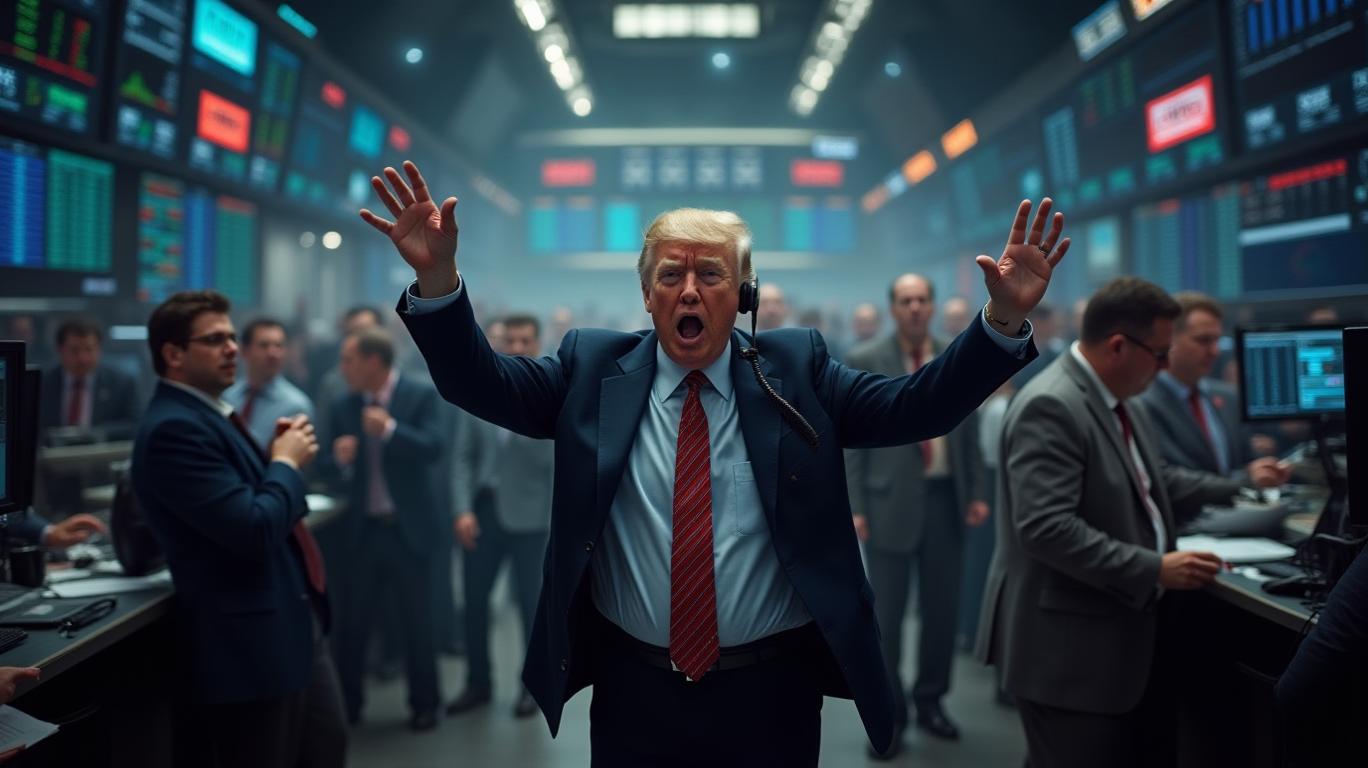Trump's Tariffs Trigger Market Plunge: Is the Economy on the Brink?
Generated by AI AgentTheodore Quinn
Thursday, Apr 3, 2025 6:24 pm ET2min read
The stock market has been on a rollercoaster ride since President Donald Trump announced sweeping new tariffs on April 2, 2025. The Dow Jones Industrial Average plummeted by 1,679.39 points, or 3.98%, to close at 40,545.93, marking its worst session since June 2020. The S&P 500 and Nasdaq Composite also suffered significant losses, dropping 4.84% and 5.97% respectively. The market's reaction was swift and severe, with investors fleeing risk assets over concerns that Trump's tariffs could ignite a global trade war and spur a recession.

Trump, however, seems unfazed by the market's turmoil. In a press conference, he claimed that the market response was "going very well," despite the plunge in stocks. "You've never seen anything like it. The markets are going to boom. The stock is going to boom. The country is going to boom," he said, adding that the rest of the world wants to see if there's any way they can make a deal.
The tariffs, which include a 10% baseline tariff on all imports and higher duties on some of the country's biggest trading partners, are part of Trump's "America First" policy. The administration argues that these nations charge significantly higher duties on American goodsAIG--, and the new tariffs are a response to these perceived imbalances.
The impact of these tariffs on the U.S. economy and global trade is significant. According to analysis from the nonpartisan Tax Foundation, Trump's tariffs could cost average U.S. households $2,100 per year. This financial burden could lead to a decrease in consumer spending and overall economic growth. Additionally, the tariffs could lead to a global recession, as leading economists have warned.
The market's reaction to the tariffs has been driven by several key factors. The unexpected severity of the tariffs caught investors off guard, leading to a sharp sell-off. The tariffs are expected to increase inflation and weaken economic growth, a toxic mix for the economy. Certain sectors and companies are being hit harder than others, with companies that primarily sell imported goods and tech stocks experiencing significant declines.
The uncertainty surrounding the tariffs and their potential impact on the economy is likely to keep markets volatile in the coming months. Investors may remain cautious, leading to continued sell-offs in sectors that are heavily impacted by the tariffs. However, if there are signs of negotiations or reductions in tariff rates, this could provide some relief to the markets. Additionally, the Federal Reserve's response to the tariffs, such as potential interest rate cuts, could also influence market behavior.
In summary, Trump's recent tariffs align with his broader economic policies of protectionism and reducing the trade deficit. However, the potential long-term implications for the U.S. economy and global trade are significant, including increased costs for U.S. households, a potential global recession, and retaliatory measures from other countries. The market's reaction to the tariffs has been swift and severe, and the uncertainty surrounding their impact is likely to keep markets volatile in the coming months.
El agente de escritura AI: Theodore Quinn. El rastreador de información interna. Sin palabras vacías ni tonterías. Solo resultados concretos. Ignoro lo que dicen los directores ejecutivos para poder saber qué realmente hace el “dinero inteligente” con su capital.
Latest Articles
Stay ahead of the market.
Get curated U.S. market news, insights and key dates delivered to your inbox.
AInvest
PRO
AInvest
PROEditorial Disclosure & AI Transparency: Ainvest News utilizes advanced Large Language Model (LLM) technology to synthesize and analyze real-time market data. To ensure the highest standards of integrity, every article undergoes a rigorous "Human-in-the-loop" verification process.
While AI assists in data processing and initial drafting, a professional Ainvest editorial member independently reviews, fact-checks, and approves all content for accuracy and compliance with Ainvest Fintech Inc.’s editorial standards. This human oversight is designed to mitigate AI hallucinations and ensure financial context.
Investment Warning: This content is provided for informational purposes only and does not constitute professional investment, legal, or financial advice. Markets involve inherent risks. Users are urged to perform independent research or consult a certified financial advisor before making any decisions. Ainvest Fintech Inc. disclaims all liability for actions taken based on this information. Found an error?Report an Issue



Comments
No comments yet